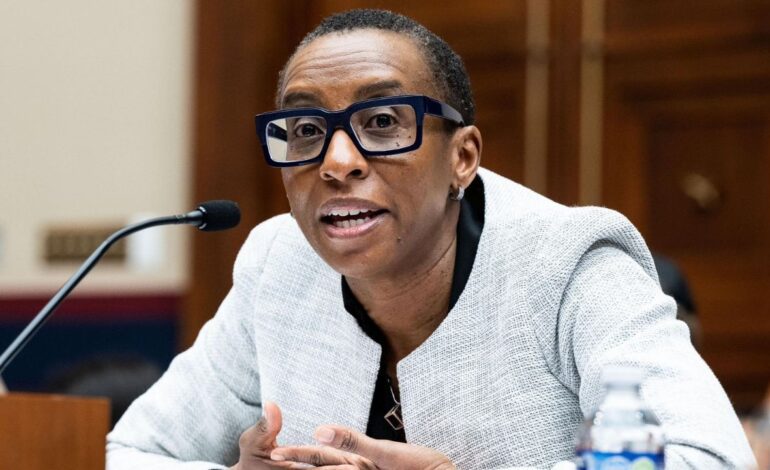Harvard President Claudine Gay has resigned, just weeks after University of Pennsylvania President Liz Magill also left her position following the university leaders’ congressional testimonies on anti-Semitism last month.
Along with backlash surrounding how she addressed anti-Semitism on campus, Gay is resigning amid a growing wave of plagiarism allegations, which were dismissed by an internal Harvard review.
“It is with a heavy heart but a deep love for Harvard that I write to share that I will be stepping down as president,” Gay wrote in a letter sent Tuesday to the Harvard community.
Gay’s resignation marks the shortest presidency in the school’s history — just six months and two days — according to the school’s student newspaper, the Harvard Crimson.
University Provost Alan M. Garber ’76 will lead in the interim until a new president is selected.
Who is Claudine Gay?
Gay, 53, was Harvard’s 30th president and took office on July 1. She was the first Black person and the second woman to lead the university.
Previously, she had been a dean for the university’s arts and sciences college. She has been with Harvard since 2006, beginning as a government professor, according to her school bio. She earned her doctoral degree in government from Harvard in 1998.
Her career has been rooted in academia and racial equity. She previously worked as a professor at Stanford University from 2000 to 2005.

Claudine Gay
What happened at the congressional hearing?
Gay, along with then-Penn President Liz Magill and the MIT President Sally Kornbluth, were asked to testify during a congressional committee hearing surrounding anti-Semitism on college campuses.
The Republican-led House Committee on Education and the Workforce asked the three women to speak to claims that universities were failing to protect Jewish students amid rising fears of anti-Semitism worldwide and fallout from Israel’s intensifying war in Gaza, which faces heightened criticism for the mounting Palestinian death toll.
The presidents spoke in what has been described as “lawyerly” prose, unable to directly decry anti-Semitism, according to critics.
When asked by U.S. Rep. Elise Stefanik (R-N.Y.) whether “calling for the genocide of Jews” would violate the colleges’ code of conduct, Gay said the response would depend on the context, adding that when “speech crosses into conduct, that violates our policies.”
Gay faced intense pressure from external voices calling for her removal or resignation, including Harvard donor Bill A. Ackman ’88, Rep. Stefanik, ’06 and conservative activist Christopher F. Rufo.
“It has been distressing to have doubt cast on my commitments to confronting hate and to upholding scholarly rigor — two bedrock values that are fundamental to who I am — and frightening to be subjected to personal attacks and threats fueled by racial animus,” Gay wrote in her email Tuesday.
The announcement comes just three weeks after the Harvard Corporation announced unanimous support for Gay after “extensive deliberations” following the congressional hearing.
Donors, too, have been both privately and publicly halting their financial contributions to Harvard. Philanthropy accounts for nearly half of the university’s annual revenue and the donor backlash sparked serious internal concern among Harvard’s fundraising staff.

University Provost Alan M. Garber, ’76, became Harvard’s interim president after Claudine Gay resigned on Tuesday.
How did things unfold after the hearing?
The presidents’ responses faced swift backlash from Republican and some Democratic lawmakers as well as the White House. Gay and Magill later apologized, but critics — including some students and faculty — said the damage was already done.
The hearing was also parodied in the cold open on Saturday Night Live.
Magill resigned from Penn, where she remains a tenured faculty member, shortly after the congressional testimony.
MIT’s Kornbluth, who became the second woman to lead the school last January and who is Jewish, has not drawn as much backlash as her counterparts and remains the school’s president.
Independent review dismissed plagiarism allegations against Gay
Separately from her testimony, Gay is also the subject of allegations that some of her published works include more than two dozen cases of plagiarism.
Allegations and investigations from different publications into Gay’s portfolio began as early as October, according to Axios. Gay asked for an independent review of her work and later, a Harvard investigation concluded that she did not violate the university’s research standards.
On Monday, six new allegations were made public through an unsigned complaint published Monday in The Washington Free Beacon, a conservative online journal that has led a campaign against Gay.
Alan M. Garber, who is Jewish, will lead the university
Gay’s decision to step down elevated Garber, the university’s provost since 2011, to the role of interim president.
As interim president, Alan M. Garber will face the difficult task of guiding Harvard through one of its most turbulent periods in nearly two decades. Garber, who is Jewish, will also be charged with uniting a campus that remains bitterly divided over the Israeli war on Gaza.
On Tuesday, Garber wrote in a statement that as interim president he will focus on “advancing our mission and helping to heal and strengthen a university that I cherish.
“There is much to be done, and while today has been a difficult day, I know what this community can accomplish together,” he added. “I am confident we will overcome challenges we face and build a brighter future for Harvard.”
Major Harvard donor says he will pause donations
Leonard V. Blavatnik, a billionaire philanthropist and major Harvard donor, will cease donations to the university over its handling of anti-Semitism on campus, Bloomberg reported on December 22, 2023, citing an anonymous source.
Blavatnik is the most high profile donor to date to end a philanthropic relationship with Harvard amid fierce criticism of Gay’s response to the Israel-Hamas war and her testimony during a congressional hearing earlier this month.
Blavatnik has previously donated at least $270 million to the university, including $200 million to Harvard Medical School in 2018 — a donation that still stands as the largest single gift in the school’s history.
Blavatnik’s decision is another major blow to Harvard’s fundraising efforts, with several major donors previously pledging to end their relationships with the university over its widely criticized initial response to the fighting in Israel and Gaza. The growing donor revolt threatens to put a strain on Harvard’s finances, as philanthropy accounts for 45 percent of the university’s annual revenue.






Leave a Reply